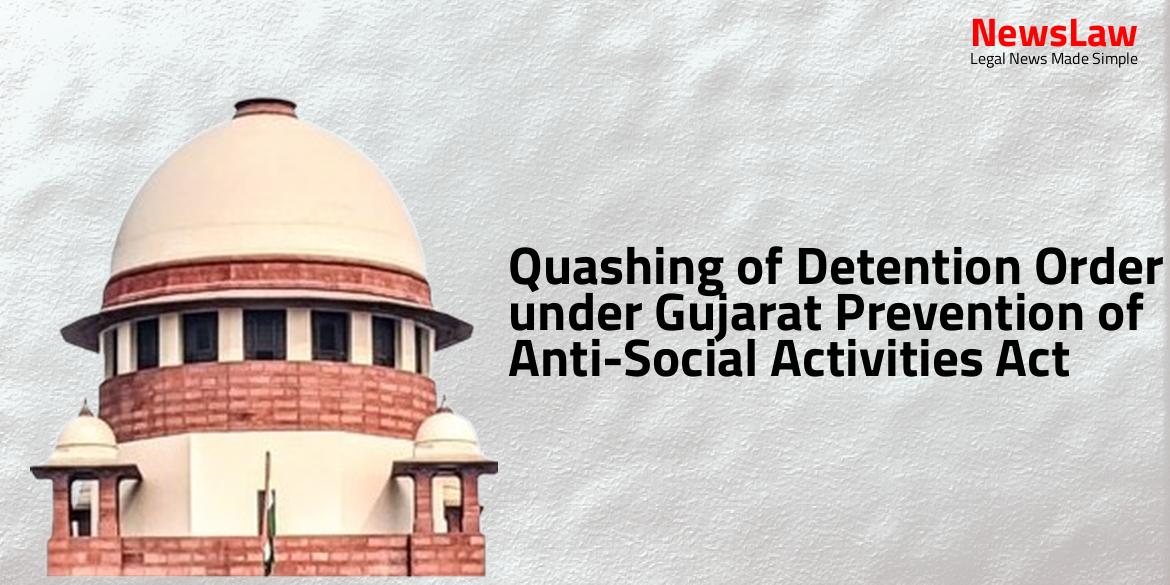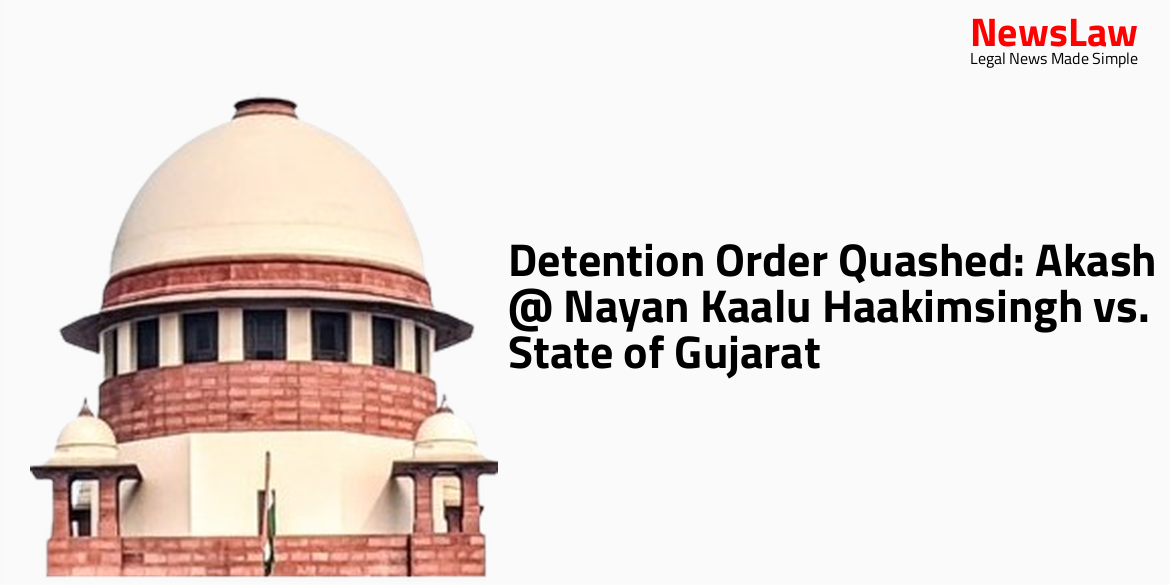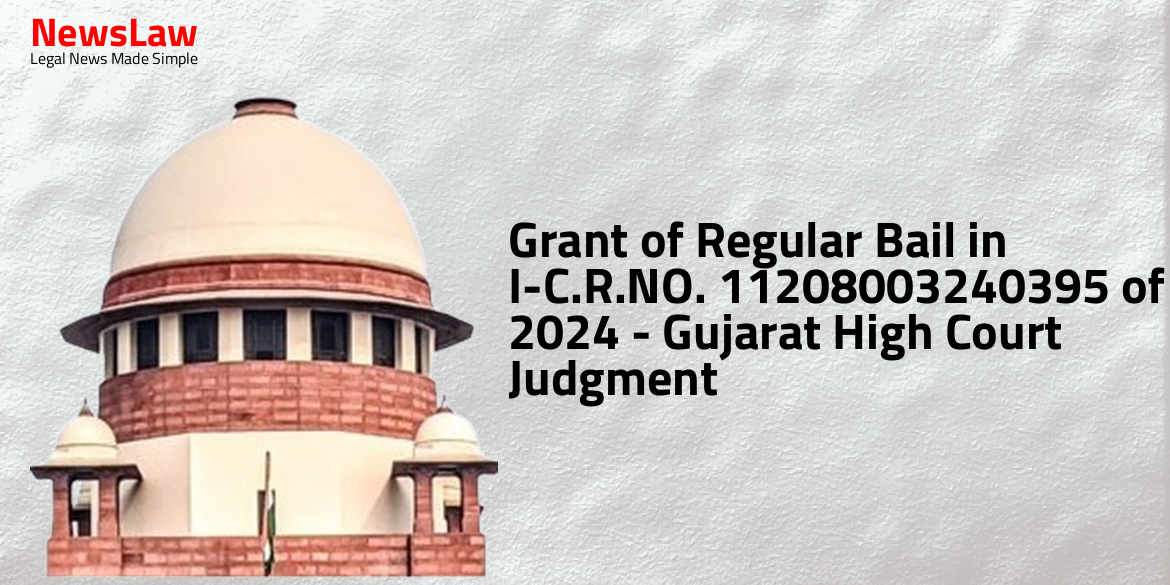The Gujarat High Court recently delivered a significant judgment regarding the quashing of a detention order under the Gujarat Prevention of Anti-Social Activities Act. The case revolved around the detainee’s alleged activities and the implications on public order. The Court’s decision emphasized upholding legal rights and due process in cases concerning public order issues. This ruling sets a precedent for ensuring that preventive detention aligns with established legal procedures and constitutional provisions. #LegalRights #DueProcess #PublicOrder
Facts
- The present petition is directed against the order of detention dated 25.1.2024 passed under Section 3(1) of the Gujarat Prevention of Anti-Social Activities Act, 1985.
- The detaining authority has detained the petitioner under the provisions of the Act.
- The petitioner is considered a detenue as defined under Section 2(c) of the Act.
Arguments
- The advocate for the petitioner argues that the order of detention should be quashed as it was based solely on the registration of three FIRs.
- The FIRs listed include offenses under various sections of the Indian Penal Code and the Gujarat Police Act.
- The advocate contends that these activities do not constitute a threat to public order but rather a breach of law and order.
- There is a lack of substantial evidence apart from the witness statements and FIR registrations to prove that the petitioner’s actions disrupt public order.
- It is argued that the detaining authority did not consider that the petitioner was released on bail for all the mentioned offenses.
- The advocate asserts that the actions of the petitioner do not pose a significant threat to the social fabric of society or the rule of law.
- The AGP for the respondent-State supported the detention order passed by the detaining authority.
- Sufficient materials and evidence were found during the investigation and provided to the detenue.
- The detaining authority passed the order based on evidence indicating the detenue’s habit of engaging in activities defined under the Act.
- The subjective satisfaction of the detaining authority was found to be not legal or valid as the alleged offenses in the FIRs did not relate to public order as required by the Act.
- Other relevant penal laws were considered sufficient to address the situation, and the allegations against the detenue were not relevant to bring them within the scope of the Act.
Analysis
- The order does not mention any application for cancellation of bail by the State authorities.
- Seeking shelter under preventive detention law is not the appropriate remedy in this case.
- The alleged offenses are punishable under the Andhra Pradesh Prohibition Act, but it has not been proven that the detenue poses a danger to public order.
- There is a lack of specific material showing that the detenue’s actions have endangered public order.
- For someone to be classified as a threat to public order under Section 2(c) of the Act, there must be substantial evidence that their actions disrupt the societal harmony and pose a significant threat to public order.
- Law and order represents the largest circle within which public order and security of State are nested.
- An act may affect law and order but not public order, just as an act may affect public order but not the security of the State.
- The expression ‘public order’ encompasses disorders of less gravity than those affecting ‘security of State,’ similar to ‘law and order’ covering disorders of less gravity than those affecting ‘public order.’
- The distinction between disturbance to ‘law and order’ and disturbance to ‘public order’ was settled by a Constitution Bench in Dr. Ram Manohar Lohia vs. State of Bihar case.
- The freedom of a human being is sacrosanct, and detention must strictly adhere to the Constitution’s provisions like Articles 21 and 22.
- Personal liberty cannot be curtailed unless extremely necessary, and detention orders must align with the established legal procedures.
- Preventive detention involves detaining a person without trial to prevent specific offenses but should not substitute ordinary law enforcement functions.
- Preventive detention should not be prolonged indefinitely; it is temporary and cannot be a tool for perpetual custody without trial.
- The Apex Court emphasized that preventive detention is exceptional and should be used judiciously without overshadowing normal legal processes.
- Every disorder does not equate to disturbing public order; it must impact the community at large to cross that threshold.
Decision
- Petitioner’s petition allowed
- Detention order of 25.1.2024 quashed and set aside
- Registration of FIRs alone does not indicate breach of public order
- No relevant material for invoking power under Section 3(1) of the Act
Case Title: NARESHBHAI BHIKHABHAI SHANKARBHAI RAVAT THROUGH RANJANBEN NARESH RAVAT Vs. THE STATE OF GUJARAT
Case Number: R/SCA/5064/2024



